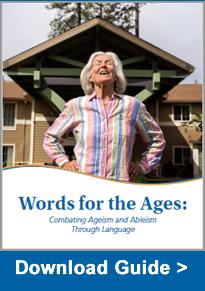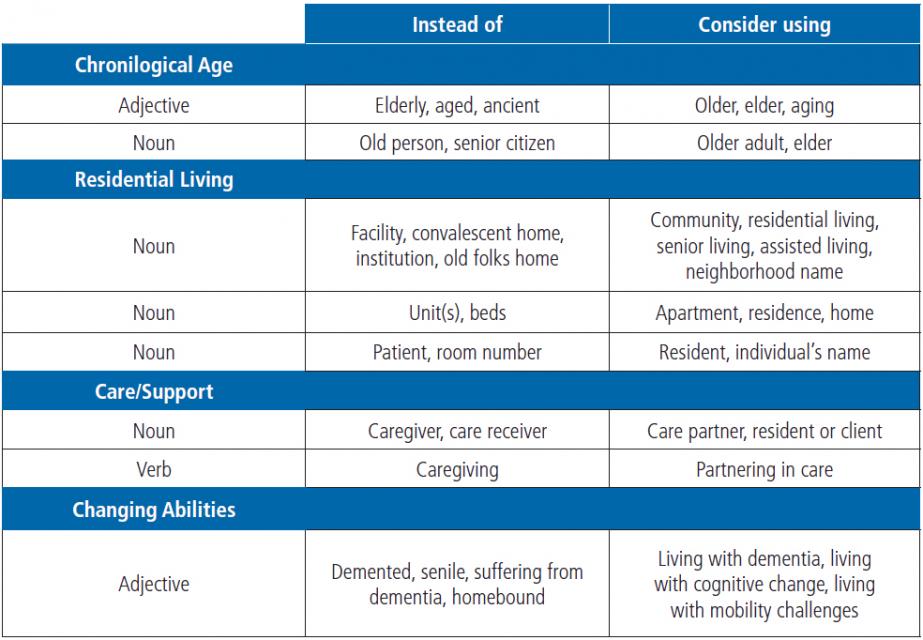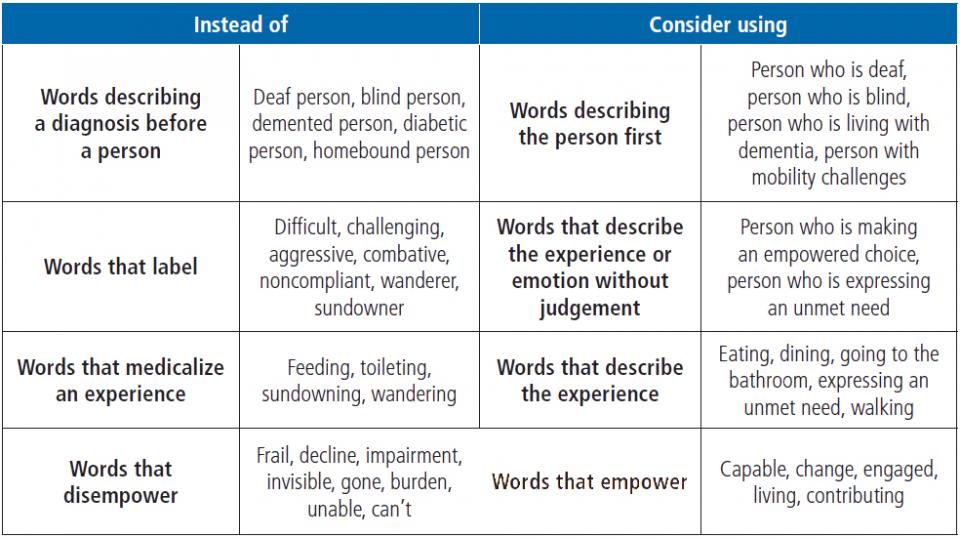Introduction
Many of us already recognize the immense power of language and how it is used to shape our perceptions and understanding of the world we live in. Even more importantly, the words we use to define other people (or sub-sets of people) have a powerful influence on how we recognize and relate to one another.
In order to create inclusive communities, it is vitally important to remember that the language we use has a profound impact on the culture we create. The words we use to describe aging influence not only our own views of aging, but also how others view age and ability. If these views are negative, they can contribute to the damaging or harmful tendencies of ageism or ableism. To ensure that we are using language that supports an age-positive culture, Eskaton strives to use words that reflect the three “I”s: individualized, inclusive and intentional.
The Power of Language
 The words we use everyday shape our thoughts without us being aware of it. In fact, differences in language influence how people act and interpret their culture. Eskaton strives to create inclusive environments that celebrate a person’s individuality, strengths and unique preferences, regardless of age and ability. We believe in utilizing language within our communities that is “individualized” and stigma-free. For example, we avoid using stereotypical age-related words such as “senior” as much as possible, because they are often closely associated with age-negative stereotypes. Instead, we use words that empower living and inspire a new way of thinking about aging.
The words we use everyday shape our thoughts without us being aware of it. In fact, differences in language influence how people act and interpret their culture. Eskaton strives to create inclusive environments that celebrate a person’s individuality, strengths and unique preferences, regardless of age and ability. We believe in utilizing language within our communities that is “individualized” and stigma-free. For example, we avoid using stereotypical age-related words such as “senior” as much as possible, because they are often closely associated with age-negative stereotypes. Instead, we use words that empower living and inspire a new way of thinking about aging.
Inclusive cultures also embrace language that is strength rather than deficit-based. Recent studies have demonstrated that older adults vastly prefer language that focuses on their abilities, knowledge and experience. Elders have shared they dislike words that emphasize their age, medical conditions, abilities or changes in their cognitive processes. For those of us in the aging services field, it is vitally important that we advocate for creating more inclusive senior living communities that do not discriminate based on age and ability. Unfortunately, ageism and ableism are the only acceptable forms of prejudice still widely accepted in our society, and senior living providers need to take a stronger stand on banishing the stigma of age that is currently embedded in their language and practices. In order to change our culture and internalized practices, we need to start with banning medicalized language. Words like “facility” and “patient” medicalize congregate living communities and frame these communities as places where people go to receive healthcare and medical treatment. Rather, utilize words that describe a social model of living that focuses on the abundance of opportunity, growth and well-being that can be found within these environments.
Just like the language we use, culture change must be intentional. For instance, when discussing topics such as Alzheimer’s disease or Parkinson’s, it is important to always use person-first, or “individualized,” language. Changing the way we talk about these conditions not only influences the lived experience for the person, but can also have an impact on the care provided.
For example, if we use the words “suffering from dementia,” our perception of dementia will likely be negative. Whereas if we hear “living with dementia” or “navigating cognitive change,” these words challenge us to think differently about the lived experience of this condition.
Lastly, the language you use when thinking or talking about your own aging process is nearly as important as how you talk about age in others, as your personal attitudes about aging can play out as “self-fulfilling prophecies.” Take a moment to think about your own view of aging. If you have a negative perception of aging, you are more likely to believe older adults are “less than” or “less capable,” simply because of their age or ability. Hopefully, this internal examination will lead you to reframe your view of aging in a positive way, one that uplifts and supports living well regardless of age and ability. It may even have a profound, positive impact on how you yourself view age and aging.
Power of Language Style Guide
Below is a list of the most frequently-used negative or ageist words, as well as some age-positive alternatives for your consideration.

Shifting From a Medical Model of Living to a Social Model of Living
Eskaton’s guiding principles about how to think, speak and address age and ability grew from Dr. Allen Power’s domains of well-being: identity, connectedness, security, autonomy, meaning, growth and joy. Eskaton looked critically at our own language choices and practices and how they either supported or challenged well-being. Through this journey, Eskaton determined that living well is possible, regardless of age and ability, and that our own approach to providing senior living and services would also benefit from adjustments to our methodology. Eskaton’s commitment to move away from a biomedical view of living to a social model of living has influenced the language and concepts we employ to discuss age and ability, in order to empower older adults in living well.


About Eskaton
Eskaton, a regional nonprofit aging services provider, Say the “F” Word has been dedicated to enhancing the lives of older adults throughout Northern California for over 50 years. Purpose-driven, inclusive, and transparent in all that we do, the Eskaton difference lies in our life-enriching signature programs and comprehensive continuum of care. Through the power of partnerships, Eskaton seeks to better serve our community by offering more diverse choices and integrating technological advancements into daily living. With a national reputation for innovation, Eskaton remains focused on creating a culture of purposeful living and being a catalyst for change.
Why We Don’t Say the “F” Word
The word “facility” has long been used to describe a wide variety of senior living and service models. Unfortunately, this particular “f word” has contributed to the overall perception that these living spaces for older adults are environments of medical treatment and nursing care, a far cry from the vibrant, engaging lifestyles enjoyed by our residents. This is why Eskaton chooses to refer to all of our senior living neighborhoods as “communities,” a word that more aptly describes the wealth of experiences, growth and well-being afforded to those who live at Eskaton.
Resources
The language examples provided in this guide are just a small sampling of the vocabulary employed by our society to discuss and portray age and ability. While they are the most frequently used words in the senior living industry, by no means should this sampling be considered a comprehensive list. For more information on the power of language, particularly in relation to ageism and ableism, please consider visiting one or more of these valuable resources:
ESKATON BLOG ARTICLES
Banish Negative Self-Talk
How Attitude About Aging Is Good For Your Health
Turn That Frown Upside Down
ESKATON DISRUPTS DEMENTIA
Eskaton’s Well-Being Project: Disrupting Dementia
Age Is Beautiful Stories
Age Is Beautiful
OTHER AMAZING RESOURCES:
Elevate Aging Style Guide
Why do people hold ageist views? What is Their source?

